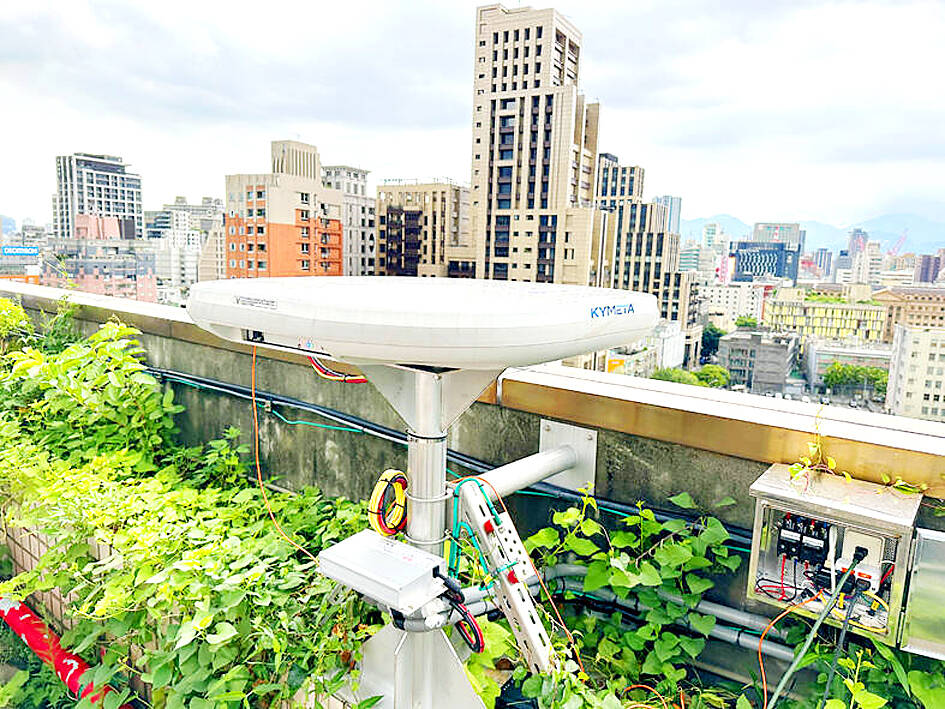Taiwan would have 24-hour access to low Earth orbit satellites by the end of this month through service provided by Eutelsat OneWeb as part of the nation’s effort to enhance signal resilience, a Chunghwa Telecom Co (中華電信) official said yesterday.
Earlier this year the Ministry of Digital Affairs, which partnered with Chunghwa Telecom on a two-year project to boost signal resilience throughout the nation, said it reached a milestone when it made contact with OneWeb’s satellites half of the time.
It expects to have the capability to maintain constant contact with the satellites and have nationwide coverage by the end of this month, Chunghwa Telecom copresident Alex Chien (簡志誠) said.

Photo: CNA
To ensure that the nation’s communication network can operate through non-geosynchronous satellites, a network that incorporates satellite equipment has been installed in Taiwan and other countries, as well as low and medium orbit satellites, he said.
The low orbit satellites are operated by OneWeb, while the medium orbit satellites are operated by satellite provider SES, he said.
“For the satellite system to operate normally, it requires three major elements: satellites in the sky, terminal equipment and ground receiving stations. All three are indispensable,” he said.
The terminal equipment used in the network includes 700 sites in Taiwan and abroad, and the ground receiving stations are set up in Japan, Thailand and Guam, he said.
“Initially there were some problems with the ground receiving station in Thailand, but OneWeb has solved the issue,” he said.
However, operating ground equipment at the sites requires trained personnel, and the ministry hopes to have the system ready by the end of the year, he said.
As for whether the network could be used by Taiwan’s business community, Chien said that since satellites have less bandwidth, most corporate customers would still use submarine cables with their larger bandwidths.
However, the satellite-based system could still be used as a backup for businesses, he said.
Department of Communications and Cyber Resilience Director-General Cheng Ming-tsung (鄭明宗) previously said that after obtaining complete coverage, which includes Taiwan proper, as well as outlying islands and counties, “we no longer need to be afraid of natural disasters or other emergencies that could knock out our communications.”
“If systems are broken, we can still provide the military and political bodies with communications through satellites,” he said. “We can make emergency calls and conduct command and dispatch.”

SECURITY: As China is ‘reshaping’ Hong Kong’s population, Taiwan must raise the eligibility threshold for applications from Hong Kongers, Chiu Chui-cheng said When Hong Kong and Macau citizens apply for residency in Taiwan, it would be under a new category that includes a “national security observation period,” Mainland Affairs Council (MAC) Minister Chiu Chui-cheng (邱垂正) said yesterday. President William Lai (賴清德) on March 13 announced 17 strategies to counter China’s aggression toward Taiwan, including incorporating national security considerations into the review process for residency applications from Hong Kong and Macau citizens. The situation in Hong Kong is constantly changing, Chiu said to media yesterday on the sidelines of the Taipei Technology Run hosted by the Taipei Neihu Technology Park Development Association. With

CARROT AND STICK: While unrelenting in its military threats, China attracted nearly 40,000 Taiwanese to over 400 business events last year Nearly 40,000 Taiwanese last year joined industry events in China, such as conferences and trade fairs, supported by the Chinese government, a study showed yesterday, as Beijing ramps up a charm offensive toward Taipei alongside military pressure. China has long taken a carrot-and-stick approach to Taiwan, threatening it with the prospect of military action while reaching out to those it believes are amenable to Beijing’s point of view. Taiwanese security officials are wary of what they see as Beijing’s influence campaigns to sway public opinion after Taipei and Beijing gradually resumed travel links halted by the COVID-19 pandemic, but the scale of

A US Marine Corps regiment equipped with Naval Strike Missiles (NSM) is set to participate in the upcoming Balikatan 25 exercise in the Luzon Strait, marking the system’s first-ever deployment in the Philippines. US and Philippine officials have separately confirmed that the Navy Marine Expeditionary Ship Interdiction System (NMESIS) — the mobile launch platform for the Naval Strike Missile — would take part in the joint exercise. The missiles are being deployed to “a strategic first island chain chokepoint” in the waters between Taiwan proper and the Philippines, US-based Naval News reported. “The Luzon Strait and Bashi Channel represent a critical access

Pope Francis is be laid to rest on Saturday after lying in state for three days in St Peter’s Basilica, where the faithful are expected to flock to pay their respects to history’s first Latin American pontiff. The cardinals met yesterday in the Vatican’s synod hall to chart the next steps before a conclave begins to choose Francis’ successor, as condolences poured in from around the world. According to current norms, the conclave must begin between May 5 and 10. The cardinals set the funeral for Saturday at 10am in St Peter’s Square, to be celebrated by the dean of the College